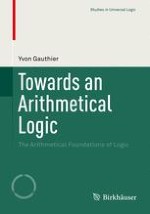2015 | OriginalPaper | Buchkapitel
7. The Internal Consistency of Arithmetic with Infinite Descent: A Syntactical Proof
verfasst von : Yvon Gauthier
Erschienen in: Towards an Arithmetical Logic
Aktivieren Sie unsere intelligente Suche, um passende Fachinhalte oder Patente zu finden.
Wählen Sie Textabschnitte aus um mit Künstlicher Intelligenz passenden Patente zu finden. powered by
Markieren Sie Textabschnitte, um KI-gestützt weitere passende Inhalte zu finden. powered by
